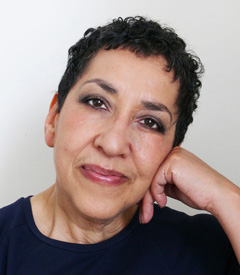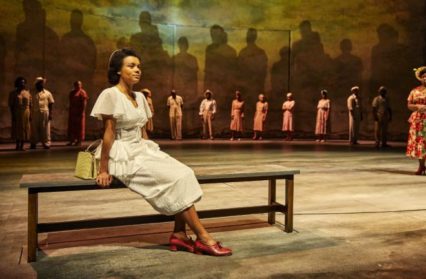Kathryn Tann watches a momentous and powerful production of Andrea Levy‘s Small Island marking ten years of the NT Live initiative.
Watching a National Theatre production from a community cinema screen is, of course, nothing compared to being in that electric atmosphere of the performance space itself. However, it is undeniable that in making our best theatre available to everyone – regardless of geography or economy – NT Live is really rather wonderful. Small Island was broadcast live in celebration of ten years of this brilliant initiative, and encore screenings will be popping up in certain venues across country over the next few weeks. You would be a fool to miss it.
It is seventy-one years since the HMT Empire Windrush first harboured at Tilbury Docks, bringing with it a new, vital era that would challenge post-war Britain. Today, the brilliance – and the bitterness – of what followed, continues to meander through our collective experience. Most importantly, it continues to feed our identity as a society: the stories, the people, the strength and the conflicts, are constantly shifting the shores of our small island. And now more than ever, it feels vital that we acknowledge what happened – to try – to begin to understand the beginning of an irreversible journey which started only decades ago.
Andrea Levy wrote Small Island in an attempt to understand her parents’ experience as members of the Windrush generation. She created a story that would take hold of its reader; four entirely separate voices woven together seamlessly – enlightening, heart-breaking and hopeful – spurring us to close the final page and place our copy earnestly into the hands of the next reader. Small Island is a book which everyone should read, and now – thanks to the skill and care of Helen Edmundson and the dedication of the National Theatre – it is also a play that everyone should, and can, witness.
Small Island is not a short book. It is filled with different details, voices and stories in a long and non-linear timeline, making it difficult to imagine a live performance being able to match the same effortlessness and clarity with which Andrea Levy carries us through the plot – at least not without simplifying it first. However, though Edmundson has altered the order of the narration, the story itself remains largely complete. There are, of course, a few omissions, but in less than three hours Helen Edmundson manages to take her audience through almost every ebb and flow of the original novel, and crucially, maintains its atmosphere. The play of Small Island does not feel rushed, nor does it feel long. We are fully invested from start to finish.
The performers themselves are for the most part outstanding. Aisling Loftus captures the child-like fire fuelling Queenie Bligh and her growing capability brilliantly. She speaks to the audience as a trusted friend, frank and open, occasionally sharing her sexual experience in such an earnest way that honours the novel and remedies the absence of on-stage sexual encounters – for in no way could that be achieved in this medium without compromising the integrity of those aspects of the story. The combination of Edmundson’s writing and Loftus’ delivery has us chuckling over awkwardness, warming to her honesty, and weeping as we watch her find the strength and foresight to give away her child in the face of a future which promises prejudice and hate.
In this final crux of the story, Andrea Levy expressed a fear in her characters we know to be well-founded. To watch the scene unfold on stage in 2019 is a powerful thing, and as Gilbert Joseph (Gershwyn Eustace Jr) delivers that unforgettable speech begging for a peace he thought had already been fought for (only to be almost comically dismissed by Bernard Bligh [Andrew Rothney]) there is on show the same absurdity and hopelessness that i present in the book. There is hope in this story, but it is offered tentatively, under a realistic current which acknowledges that this is true history, this was life, and this was just the beginning.

This praise is, of course, the tip of the iceberg. Small Island’s cast are full of highlights: the trembling sweetness of Arthur, played by David Fielder; the booming, hopeful, patient presence of Gilbert which so shined in the novel; and the wide-eyed innocence hidden beneath the haughtiness of Leah Harvey’s Hortense. Harvey, like Loftus, intuitively brings forth the ultimate tragedy of Levy’s story: that bitter juxtaposition between expectation and reality.
And this is a story full of those contradictions of real life. The highest praise to be given to this production – and what separates it from other adaptations – is the laughter it brings. This play lifts its audience with golden-tinted moments of comedy, and it is this which brings the humanity: just as in the novel, it is this which makes the sadness of Small Island throb.
Indeed, the production as a whole maintains this skilful balance of performance and history. That billowing projection of the HMT Empire Windrush, towering over the performers as Gilbert boards for Britain, unapologetically enforces the stark origin of that now loaded word. The use of archive film footage, the faces of the first migrants whose children may be sitting among us, further reminds the audience the truth behind the tears and laughter of the play. Likewise, the clever use of cast – and at one point the entire cast – to orchestrate scene changes (instead of a handful of silhouetted stage-hands darting about in the dark) evokes the countless people living through the same events, placing Small Island each time more firmly into its historical context.
Occasionally, the cast of a National Theatre production will be almost out-shone by their surroundings. The spectacle of the staging, the seamlessness of the sound, lighting and scene changes are usually a work of creative genius in their own right, and this production was no exception. But in this case, the performance on stage worked in stunning harmony with the production design. You will gasp, smile and feel your way through this play, and leave feeling overwhelmingly glad that you had the chance to see it.
Andrea Levy very sadly passed away earlier this year, but no doubt she would have been in humble awe of the standing ovations that Small Island has been receiving, and felt the joy of what that audience is standing for – a collective appreciation for the significance of the story, and for the unique and unifying power of theatre such as this.
Kathryn Tann is an editor at Parthian Books and a contributor to Wales Arts Review.












